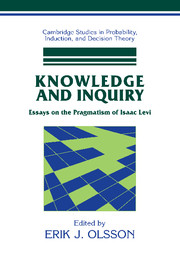Book contents
- Frontmatter
- Contents
- List of Contributors
- Preface
- Introduction: The Pragmatism of Isaac Levi
- 1 Isaac Levi and His Pragmatist Lineage
- 2 Is Pragmatist Truth Irrelevant to Inquiry?
- 3 The Knowledge Business
- 4 Infallibility and Incorrigibility
- 5 Why Inconsistency Is Not Hell: Making Room for Inconsistency in Science
- 6 Levi on Risk
- 7 Vexed Convexity
- 8 Levi's Chances
- 9 Isaac Levi's Potentially Surprising Epistemological Picture
- 10 Isaac Levi on Abduction
- 11 Potential Answers – To What Question?
- 12 Levi and the Lottery
- 13 The Value of Truth and the Value of Information: On Isaac Levi's Epistemology
- 14 Decision-Theoretic Contraction and Sequential Change
- 15 Deciding What You Know
- 16 Levi's Ideals
- 17 The Mind We do Not Change
- 18 Psychoanalysis as Technology
- 19 Levi on Money Pumps and Diachronic Dutch Books
- 20 Levi on the Reality of Dispositions
- 21 Replies
- Index
- References
Introduction: The Pragmatism of Isaac Levi
Published online by Cambridge University Press: 05 March 2010
- Frontmatter
- Contents
- List of Contributors
- Preface
- Introduction: The Pragmatism of Isaac Levi
- 1 Isaac Levi and His Pragmatist Lineage
- 2 Is Pragmatist Truth Irrelevant to Inquiry?
- 3 The Knowledge Business
- 4 Infallibility and Incorrigibility
- 5 Why Inconsistency Is Not Hell: Making Room for Inconsistency in Science
- 6 Levi on Risk
- 7 Vexed Convexity
- 8 Levi's Chances
- 9 Isaac Levi's Potentially Surprising Epistemological Picture
- 10 Isaac Levi on Abduction
- 11 Potential Answers – To What Question?
- 12 Levi and the Lottery
- 13 The Value of Truth and the Value of Information: On Isaac Levi's Epistemology
- 14 Decision-Theoretic Contraction and Sequential Change
- 15 Deciding What You Know
- 16 Levi's Ideals
- 17 The Mind We do Not Change
- 18 Psychoanalysis as Technology
- 19 Levi on Money Pumps and Diachronic Dutch Books
- 20 Levi on the Reality of Dispositions
- 21 Replies
- Index
- References
Summary
Isaac Levi's philosophical thinking has shown remarkable stability over the years. Basically, it all started with his first book, Gambling with Truth, which outlines a research program whose key element is the decision-theoretic reconstruction of epistemology. Much of the rest of his work in epistemology has been devoted to extending and implementing this original program. With one important exception, there is little in his philosophical picture that has changed radically over the years. There have been changes, to be sure, but they have taken place at the level of detail rather than at the level of fundamental principle. The main exception is the issue of fallibilism. Starting out as a fallibilist, Levi became an infallibilist in the 1970s. The problem is that the corrigibility of our view suggests its fallibility: If we agree, as we must, that our view may change in the future, then it seems that we are never entitled to accept as true any claims of empirical substance now. But we do accept things as true now. Levi writes, in retrospect, that in the 1960s he unwittingly solved this problem for himself “by remaining in a fog of confusion” (Levi 1984, p. xiv), adding that by 1971 he had reached the conclusion that corrigibility and fallibility are best kept separate and, in particular, that endorsing corrigibilism is compatible with rejecting fallibilism. The paper “Truth, Fallibility and the Growth of Knowledge” was the first expression of this important revision.
Information
- Type
- Chapter
- Information
- Knowledge and InquiryEssays on the Pragmatism of Isaac Levi, pp. 1 - 17Publisher: Cambridge University PressPrint publication year: 2006
